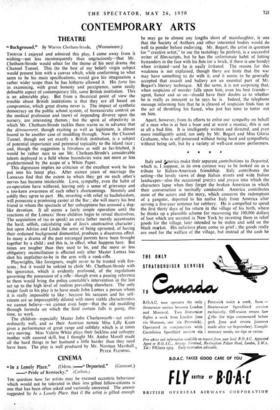CONTEMPORARY ARTS
THEATRE "'Background." By Warren Chetham-Strode. (Westminster.) THOUGH 1 enjoyed and admired this play, I came away from it wishing—not less inconsequently than ungraciously—that Mr. Chetham-Strode would select for the theme of his next drama the Channel Tunnel. This (to the best of my belief) virgin subject would present him with a canvas which, while conforming to what seem to be his main specifications, would give his imagination a rather wider scope than he has hitherto allowed it. His forte lies
in examining, with great honesty and percipience, some easily definable aspect of contemporary life, some British institution. This is an admirable play. But from a theatrical point of view the trouble about British institutions is that they are all based on compromise, which great drama never is. The impact of synthetic democracy on the public school system, of bureaucratic control on the medical profession and (now) of impending divorce upon the nursery, are interesting themes ; but the spirit of objectivity in which Mr. Chetham-Strode tackles them warns us in advance that the denouement, though exciting as well as legitimate, is almost bound to be another case of muddling through. Now the Channel Tunnel, though not yet exactly a British institution, is a subject of potential importance and perennial topicality to the island race ; and, though the suggestion is frivolous as well as far-fetched, it would be rather nice to see Mr. Chetham-Strode's considerable talents deployed in a field whose boundaries were not more or less predetermined by the scope of a White Paper.
This digression implies no criticism of the excellent work he has put into his latest play. After sixteen years of marriage the Lomaxes find that the extent to which they get on each other's nerves has become intolerable. Love, sympathy, even the habit of co-operation have withered, leaving only a sense of grievance and a too-keen awareness of each other's shortcomings. Stormily and coldly they agree to part. He, reverting with relief to bachelordom, will prosecute a promising career at the Bar ; she will marry his best friend in whom the spectacle of her unhappiness has aroused a dog- like devotion. It all seems a fairly simple operation until the reactions of the Lomaxs' three children begin to reveal themselves. The acquisition of (so to speak) an extra father merely accentuates the hard, selfish, calculating side of Jess's unattractive character ; but upon Adrian and Linda the sense of being uprooted, of having their ordained background dismantled, produces a disastrous effect. In many a drama of the past estranged parents have been brought together by a child ; and this is, in effect, what happens here. But times are tougher than they used to be, and the more or less obligatory reconciliation is effected only after Master Lomax has shot his stepfather-to-be in the arm with a rook-rifle.
Playwrights, like foreigners, ought never to be trusted with fire- arms ; but it would be unkind to chide Mr. Chetham-Strode with his ignorance, which is evidently profound, of the regulations governing the possession of a rifle—though even a passing reference to them would bring the police constable's intervention in the last act up to the high level of realism prevailing elsewhere. The only major fault in his play is to have made John Lomax a person whom it is really impossible to like ; because his sarcasm and his self- esteem are so imperceptibly diluted with more viable characteristics we cannot believe—we cannot even hope—that the old muddling through formula on which the final curtain falls is going, this time, to work.
The children—especially Master John Charlesworth—act extra- ordinarily well, and as their Austrian nannie Miss Lilly Kann gives a performance of great range and subtlety which is at times very moving. Miss Valerie White plays their feckless and unhappy mother with assured skill, but I thought Mr. Andre Morell made all the hard things in her husband a little harder than they need have been. The play is well produced by Mr. NOrman Marshall.,, PETER FLEMING.






































 Previous page
Previous page